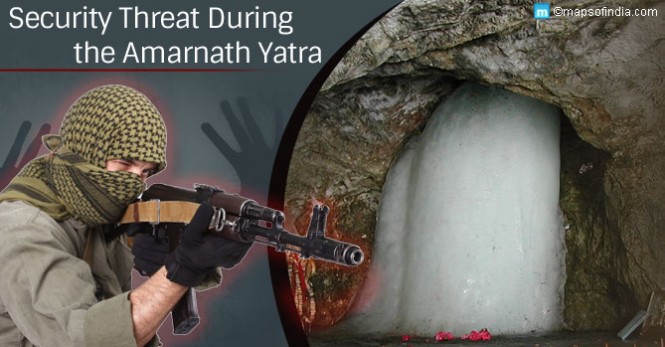 The incidents of Pakistan-based terror groups disrupting normalcy in India have happened umpteen number of times in the past. In the latest such incident, some of the most dreaded terror groups such as Lashkar-e-Taiba have sent their cadres to perform suicide attacks during the Amarnath Yatra that happens every year in India. Both the central government and the government of Jammu & Kashmir have been alerted regarding possible security issues during the pilgrimage that witnesses thousands of pilgrims undertaking a difficult journey to a shrine perched high in the Himalayan region that falls in southern part of the state.
The incidents of Pakistan-based terror groups disrupting normalcy in India have happened umpteen number of times in the past. In the latest such incident, some of the most dreaded terror groups such as Lashkar-e-Taiba have sent their cadres to perform suicide attacks during the Amarnath Yatra that happens every year in India. Both the central government and the government of Jammu & Kashmir have been alerted regarding possible security issues during the pilgrimage that witnesses thousands of pilgrims undertaking a difficult journey to a shrine perched high in the Himalayan region that falls in southern part of the state.
Operation Shiva: Why and How?
Operation Shiva was launched by the Indian Army on 2 July with an aim to thwart any possible mishap owing to the actions of the terror groups. 7500 soldiers have been entrusted with the task of finding out 10-15 terror operatives who have crossed the border to get into Kashmir before the yatra starts. Meanwhile, local police and the central paramilitary forces have also employed 10,000 officers to protect the people who will be taking the two roads to Amarnath. Incidentally, these routes are the most highly preferred ones as far as getting to the shrine is concerned.
Review of Security Arrangements
The security arrangements have also been checked by none other than Rajnath Singh, the Union Home Minister. The cave, which is the ultimate end of this particular pilgrimage, is located in the Anantnag district. It is highly revered by Hindus. The journey started on 3 July and it is being carefully monitored by paramilitary soldiers, state police officers and members of local administration. The yatra will go on for 59 days.
Attacks on Telecom Sector: Role of Hizbul Mujahideen
The terrorists have meanwhile started their handiwork. The region’s telecom employees and infrastructure have come under attack. Even shops that sell mobile phones have been attacked. It is being said that there is sufficient evidence to suggest that the aforementioned attacks had been orchestrated in order to jeopardise the communication facilities in the area. These attacks, which were purportedly carried out by Hizbul Mujahideen, had taken place during May at Sopore in the northern part of Jammu & Kashmir. The militants had reportedly placed devices in these towers with which they were able to keep in touch with their handlers based in Pakistan. The Hizbul Mujahideens were angered when these devices were taken down by the security officials of Jammu & Kashmir and it was only then that they attacked the towers. With disrupted communications it would have been hard for both the civilians and army officers to get in touch with others and it would have played right into the hands of the terrorists, who would have found it easier to create the atmosphere of terror.
Attempts by Kashmiri Separatists
The government also seems worried at the possibility of Kashmiri separatists organising protests at this time. Right now, Jammu & Kashmir has a coalition government with PDP – led by Mufti Mohammed Sayeed – and BJP. Officers have also received alerts that local youth may be asked to become a part of the protests. If these protests do happen, they will be a major source of embarrassment for the party.
Kiren Rijiju, the Minister of State for Home Affairs, has also stated that there is a distinct possibility that the yatra could come under attack this time as well. Rijiju has said that even though the authorities have taken all the necessary precautions and made all the arrangements that need to be made, they still cannot afford to let their guard down.
Read more:
Amarnath Yatra 2017
Amarnath Temple in Jammu and Kashmir
Amarnath Cave Story
The Kaavad Yatra in India




